

L. N. Dantzler Lumber Co.
|
Standard gauge Headquarters: Moss Point, MS Mill Location: Moss Point, MS (Jackson County) other mills operated under subsidiary names Mill Capacity: 125,000 ft/day in 1910 at "LND Mill" Years of Operation: 1877-1942 Miles Operated: 30 in 1910 (at Vancleave) Locomotives Owned: 5 + 150 cars in 1910 (at Vancleave) |
See individual pages on subsidiary mills: Bond Lumber Co. at Bond Cedar Lake Mill Co. at Cedar Lake Handsboro Lumber Co. at Handsboro Native Lumber Co. at Howison Ten Mile Lumber Co. at Ten Mile Vancleave Lumber Co. at Vancleave |
Click Map for Larger Version |
|
L. N.
Dantzler Lumber Company Story by Tony Howe
In 1877, when L.N. Dantzler bought
his first sawmill from his father-in-law, William Griffin, Moss Point was
already an established lumber center. In that year, there were twenty-five
sawmills in the Pascagoula-Moss Point area, producing a reported
50,000,000 board feet of lumber that year. The first of these
mills was built in 1836 by Beardslee and Bradford. Moss Point’s location
made it well-suited for locating a sawmill. Situated at the confluence of the Escatawpa and Pascagoula
Rivers, mills at Moss Point could raft logs down either of these rivers,
both of which stretched inland many miles.
Ships from the Gulf of Mexico could be loaded with finished lumber
directly at the mills. The L.N. Dantzler Lumber Company
became not only the largest lumber company in Moss Point, but also
one of the largest in Mississippi. Lorenzo Nollie Dantzler was born on
December 31, 1833, near the present town of McLain, Mississippi, in Greene
County. He was the son of John Lewis Dantzler and Elizabeth Dantzler, both
of whom came to Mississippi from the Orangeburg area in South Carolina. L.
N. Dantzler attended Centenary College, in Shreveport, La. In 1855, after
graduating college, Dantzler purchased a two story brick building on Royal
Street in Mobile, Alabama, and entered the cotton business with his uncle,
Gabriel Bruner Dantzler. On November 18, 1857, L. N. Dantzler married
Sarah Eran Griffin, daughter of Moss Point lumberman William Griffin.
After serving in the Confederate army, Dantzler moved to Moss Point, and
joined his father-in-law in the sawmill business. William Griffin was born in 1800, in Perry
County, Mississippi. He married Mary Evans and had seven children. Griffin
purchased his first property in Moss Point in 1840 from Simon Cumbest.
Griffin sold dried venison in Mobile, and with this money purchased large
tracts of land and large herds of cattle, which numbered by the thousands
by 1850. Griffin also rafted timber down Black Creek and the
Pascagoula River to Moss Point before 1850. In 1849, William Griffin joined the firm of
Arnold, Sheldon & Co. J.M. and J.P. Arnold, along with W. M. Sheldon,
came from Berkshire County, Massachusetts in 1847, and purchased a sawmill
from D.J. Files on the south bank of the
Escatawpa River at Moss Point. On
November 27, 1850, Griffin, Sheldon, and the two Arnolds organized the
partnership for a period of ten years. After the death of one of the
Arnolds in the explosion of a steam boiler, Griffin took over as manager
of the mill, and his partners managed the marketing end of the business.
Arnold, Sheldon and Company owned retail lumber yards in Boston and New
Orleans, where they shipped finished lumber in company-owned schooners
from the Moss Point mill. In 1858, the firm expanded the business with the
purchase of a gang sawmill. This mill continued to be used until 1905.
As set out in the partnership agreement, the firm was dissolved in
1860. The partners sold all of their property to Griffin for $60,000. In
return, Griffin assumed responsibility for all debts. After all the
business was settled, Griffin had profited to the extent of $10,309.75. After the dissolution of Arnold, Sheldon
and Co., William Griffin then organized another partnership, known as
William Griffin & Company. His partners this time were his sons, Jacob
Washington Griffin, John Alfred Griffin, and Erasmus Frank Griffin.
William Griffin and Co. purchased the old Arnold, Sheldon & Co. mill
at Moss Point. In addition to this mill, the company also operated ships,
barges, a commissary store, a shipyard, and various other enterprises.
During the War Between the States, when the Northern Army occupied the
area around Moss Point, it was said that William Griffin dismantled the
sawmill and hid parts of it in the nearby marshes to prevent the Northern
military forces from finding and destroying it. Griffin also sank many of
the cypress logs in the lakes to prevent them from being confiscated.
After the War, William Griffin & Co. purchased a sawmill from Col.
Milne that was located about five miles north of Moss Point, near Three
Rivers. Col. Milne, a colonel of a colored regiment during the war, built
this large mill in partnership with a number of other northern men shortly
after the war. After a year or so, the sawmill went bankrupt. Griffin then
bought the mill and moved it to the north bank of the Escatawpa River,
just east of the Pascagoula River and across from Griffin’s other mill.
After the War, Griffin’s son-in-law, L. N. Dantzler, joined the
partnership. Then, on June 15, 1869, J. A. Griffin sold his interest in
the firm back to his father for $15,000. J.W. Griffin also left the firm
sometime after his brother. Then, on March 1, 1877, the firm of William
Griffin and Company was officially dissolved. L. N. Dantzler assumed
responsibility for all debts and credits of the old company. After the dissolution of William Griffin and Company in 1877, L. N. Dantzler rented a sawmill from William Griffin, and bought timber rafted down the Pascagoula River, much of it from William Calvin Griffin, Dantzler’s brother-in-law. The late 1870's was a period of prosperity for the sawmills in Mississippi. Prices for finished lumber ranged from $10 to $15 per thousand board feet. During this period timber could be purchased from loggers for $3 to $5 per thousand board feet. Dantzler’s lumber business prospered and he was soon able to purchase the sawmill from Griffin and small tracts of timber. Most of the logs to supply the mill, however, were still purchased directly from the loggers, many of whom owned their own timberland. In 1883, L. N. Dantzler decided to build a
much larger mill at Moss Point. The site chosen for the new mill was on
the north bank of the Escatawpa River immediately north of the old mill
and office, on the site of the Griffin mill that burned in 1879. Work on
the new sawmill, known as the “LND Mill,” took over a year to
complete. The mill was being built by the Filer and Stowell Co., of
Milwaukee, Wisc., and was placed in operation by March 27, 1885. At that
time, it was one of the largest mills in the South. The mill, which had a
circular saw and a gang saw, had an average capacity of 65,000 to 70,000
board feet per day. By 1901, this mill capacity was increased to 125,000
feet per day. After the mill was placed in operation, the
company became increasingly profitable. Lumber prices continued to rise.
As the Dantzler business continued to grow, two of L.N. Dantzler’s sons
joined their father in the family business. L.N. Dantzler, Jr., known as
Noll, joined the company in 1885, after graduating from the University of
Mississippi, where he majored in Civil and Mechanical Engineering. He went
to work first as a striker in the blacksmith shop. He then held various
jobs throughout the mill, and by the age of 24, had complete charge of all
the outside operations, which enabled his father to attend the financial
administrative and sales matters in the office. L.N. Dantzler’s oldest son, John Lewis
Dantzler, graduated from the University of Mississippi with a degree in
law. Lewis, instead of joining his father’s company, decided to practice
law at Scranton with his partner, R.D. Ford. After a few years, however,
Lewis was persuaded by his father to leave his law practice and join in
the lumber business. Lewis gradually took over the administrative duties
and Noll handled the logging, manufacturing, and marine operations. The
father and two sons made a valuable team. Lewis was said to be extremely
optimistic and wanted to expand rapidly. Noll, however, was a pessimist.
Their father became the arbitrator and usually worked everything out to
the best interest of the company. They acted upon nothing of importance
without consulting each other. As the business continued to expand, the
Dantzlers decided to incorporate the business. The L.N. Dantzler Lumber
Company was incorporated on March 1st, 1888, thus becoming the first
private corporation in the State of Mississippi.
The paid in capital stock in the new
company was set at $200,000, divided into 2000 shares of $100 each. L.N.
Dantzler, as president and treasurer, held 1500 shares, and had a salary
fixed at $5000 per year. J.L. Dantzler became secretary of the new
company, and held 250 shares. L.N. Dantzler, Jr. became vice-president,
receiving 250 shares. For the first two decades of the
company’s existence, the L.N. Dantzler Lumber Company depended almost
entirely on contract loggers to supply the company’s large sawmills at
Moss Point with logs. With the expansion of the company in the late
1800's, a more dependable system of collecting raw materials was needed to
keep the large sawmill at Moss Point running continuously. Large tracts of
timber were bought throughout the 1890's, with most being accessible to
the larger creeks flowing into the Pascagoula River. By 1899, the company
was reported as owning 115,000 acres of timberland. To transport logs to
the mills at Moss Point, a standard gauge logging railroad was built in
1900 from Vancleave northwestward into this timberland. From Vancleave,
the logs were rafted down Bluff Creek and the Pascagoula River to the
mills at Moss Point. The railroad was gradually extended northwestward,
and eventually reached into Harrison County and what is now Stone County. L. N. Dantzler Lbr. Co. used profits made
at the Moss Point mills to expand the company. On April 4, 1899, the
sawmill, logging railroad, and timberlands of the J. F. Welch Lumber Co.
at Howison, Mississippi, was purchased for $75,000. To operate this mill,
the Native Lumber Company was incorporated at Howison, Harrison County, on
May 16, 1899 by L. N. Dantzler, J. L. Dantzler, L. N. Dantzler, Jr., G. H.
Howze, Joseph Bozeman, Henry Colmer, George Bowen, Alexander McInnis and
John Alberts with authorized capital stock of $75,000. L. N. Dantzler, Jr.
was president. The sawmill had a capacity of about 70,000 feet daily and
cut principally for export, most of the product being marketed by the L.
N. Dantzler Lumber Company. In late 1902, the decision was made to
build a sawmill at Vancleave. The small mill was finally completed in May
1903 and placed in operation. To operate this mill, the Vancleave Lumber
Company was incorporated at Moss Point, Jackson County, on July 1, 1903 by
L. N. Dantzler, J. L. Dantzler, L. N. Dantzler, Jr., A. F. Dantzler and G.
B. Dantzler with authorized capital stock of $50,000. The mill only lasted
a few years, but the company continued to exist as a timber-holding and
logging subsidiary of the Dantzler Lbr. Co. to supply the mills at Moss
Point for many years. To supplement its already large mills at Moss Point, the L. N. Dantzler Lumber Co. built a large band mill at Moss Point in late 1904. This mill, which opened in January 1905, had a capacity of 75,000 board feet per day. It was located on the south side of the Escatawpa River. To add to its already substantial holdings,
the Dantzlers purchased the holdings of Henry Lienhard in early 1906. The
Handsboro Lumber Company was incorporated by the Dantzlers on February 22,
1906 with capital stock of $100,000 to take control of the Lienhard
holdings, which included a sawmill at Handsboro, near Gulfport, timberlands,
and a narrow gauge logging railroad running from Cedar Lake, on the
Tchoutacabouffa River, northward into what is now northeastern Harrison
County. The sawmill had a cutting capacity of 40,000 feet per day by 1910.
It appears that the mill at Handsboro closed
as early as 1914 and never reopened. The narrow gauge railroad continued to
operate under the management of Dantzler & Izard Co. In 1919, a larger
mill was built at the terminal of the logging railroad at Cedar Lake. This
mill, which cut 125,000 feet per day, was built on the island in the middle
of Cedar Lake, and was known as the Cedar Lake Mill Company. The narrow
gauge railroad was relocated to run northwest from Cedar Lake, ending very
near the G&SI near Wortham. In 1910, the Dantzler Company continued to
expand with the purchase of two large sawmills on the G&SI Railroad. In
June 1910, the Ten Mile Lumber Company at Ten Mile, near Perkinston, was
purchased by the Dantzlers. The sale included a new 75,000 feet capacity
sawmill, planing mill, dry kilns, logging railroad and timberlands. Also in
1910, the Dantzlers leased the sawmill of the Bond Lumber Co., located at
Bond, Mississippi. This mill, which was previously operated by the J. E.
North Lbr. Co., had a cutting capacity of 150,000 feet per day and was
equipped with two double cutting band saws and a gang saw. After the J. E.
North Lbr. Co. was declared bankrupt, the mill was purchased by the Bond
Lbr. Co. on June 27, 1910 for $795,000. The Bond Lumber Company was
incorporated at Gulfport, Harrison County, in April 1910 by Z. D. Davis, C.
A. Alexander and J. A. Alexander, all of Jackson, MS, with capital stock of
$1,000,000. After leasing the plant for five years, the L. N. Dantzler Lbr.
Co. purchased the plant in 1915. After decades of expansion, the 1920's saw
the gradual closing of several Dantzler mills due to a dwindling timber
supply. The first large mill to close was at Bond on October 4, 1919. This
was followed by the closing of the Ten Mile Lbr. Co. in 1922.The mill at
Howison managed to hang on until closing down in 1928, while the mill at
Cedar Lake lasted until late 1927. The logging railroad at Vancleave shut
down in October 1926. Both the Vancleave Lbr. Co. and Native Lbr. Co.
corporations were dissolved in December 1931. The “LND Mill” at Moss Point shut down
around 1928. The band mill at Moss Point, however, continued to operate many
more years, although on a much smaller level than previous years. The
logging railroad equipment at Vancleave was relocated to Moss Point. A new
logging railroad was built in 1929 off of the Mississippi Export Railroad to
tap a new tract of timber near the Jackson-George County line east of the
Pascagoula River. This operation proved to be short-lived, however. After
about two or three years, the use of these log trains was discontinued,
bringing an end to over three decades of use of logging railroads by the L.N.
Dantzler Lumber Co. The mill on the south side of the Escatawpa River at
Moss Point continued to operate until it was finally shut down in 1942. In
1936, sufficient timber had grown back on company owned land to justify
rebuilding a sawmill at Ten Mile. This mill, completed in 1937, contained a
54" band mill and could cut 5 million feet per year. All logging for
this mill was done by truck. In 1949, this mill shut down. After that time,
the L.N. Dantzler Lumber Company remained as a tree farming company, and
sold trees on a selective cutting basis. The company’s main office was
moved from Moss Point to Ten Mile in 1946. In 1966, the company was finally
sold to International Paper Company, who still manages the remaining
Dantzler lands and maintains offices in the old Dantzler office building at
Ten Mile.
|
||
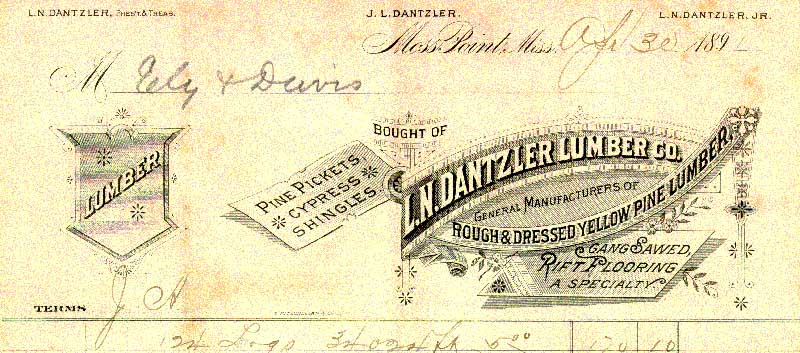 |
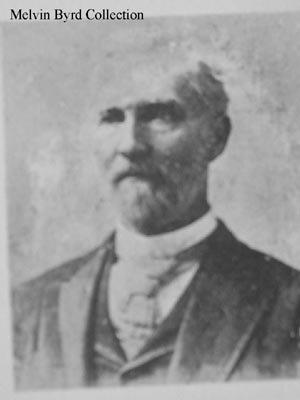
L. N. Dantzler, Sr. |
|
|
L. N. Dantzler, Jr. |
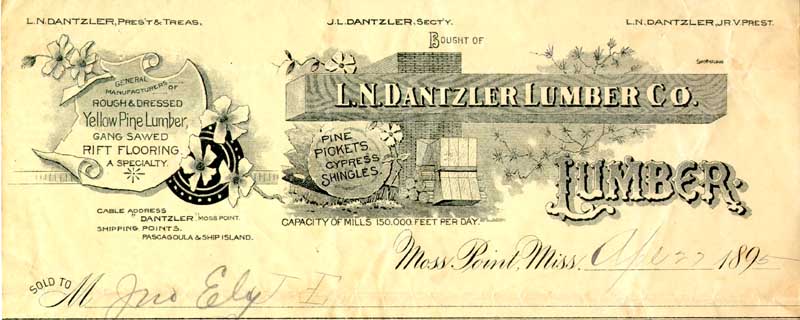 |
|
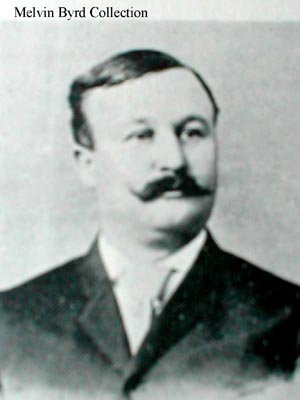
John Lewis Dantzler |
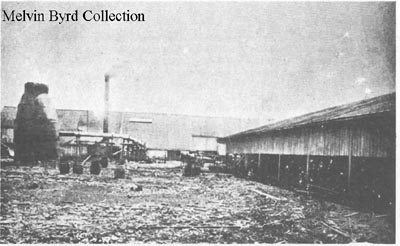
Dantzler planing mill at the "band mill" on the south bank at Moss Point. |
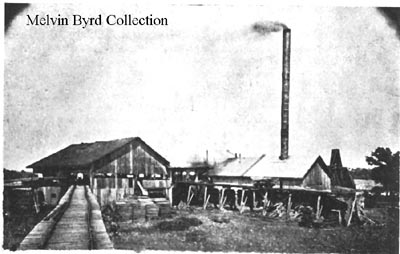
Another view at the Dantzler "band mill" at Moss Point. |
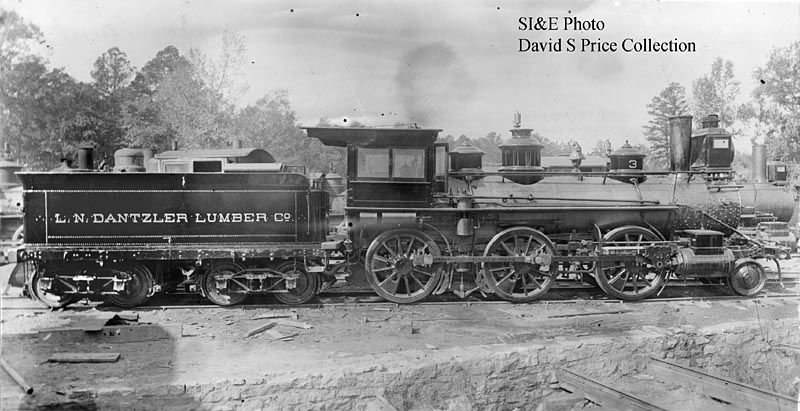
L. N. Dantzler No. 3 at the dealer in Atlanta before delivery to Vancleave. |
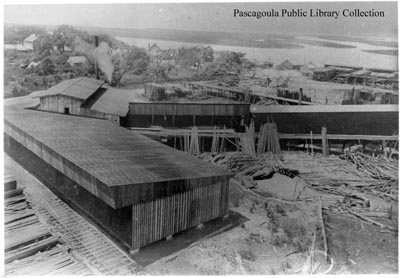
L. N. Dantzler planing mill and lumber shed at the "band mill" at Moss Point. |
|
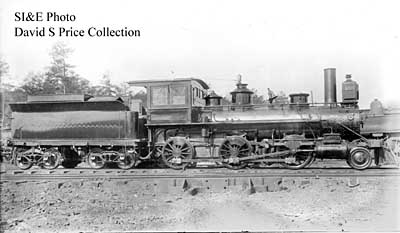
L. N. Dantzler Lumber No. 4 at SI&E in Atlanta in 1906. |
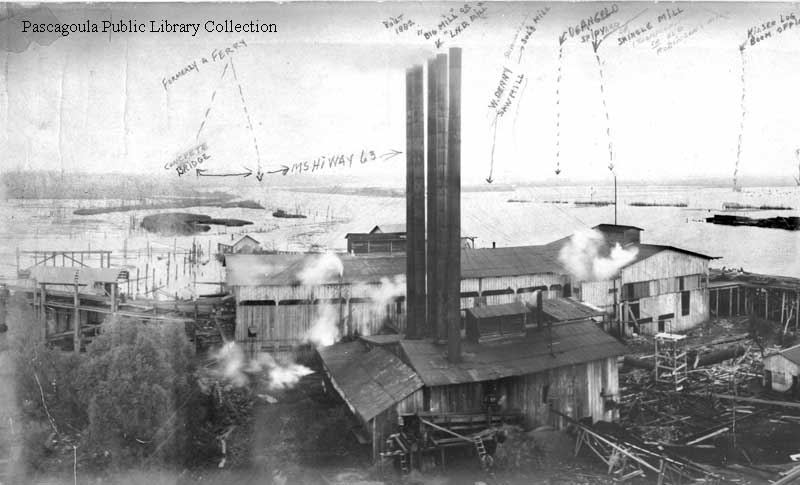
L. N. Dantzler Lbr. Co.'s mill on the north bank of the Escatawpa River was built in 1884 and known as the "L N D Mill." |
|
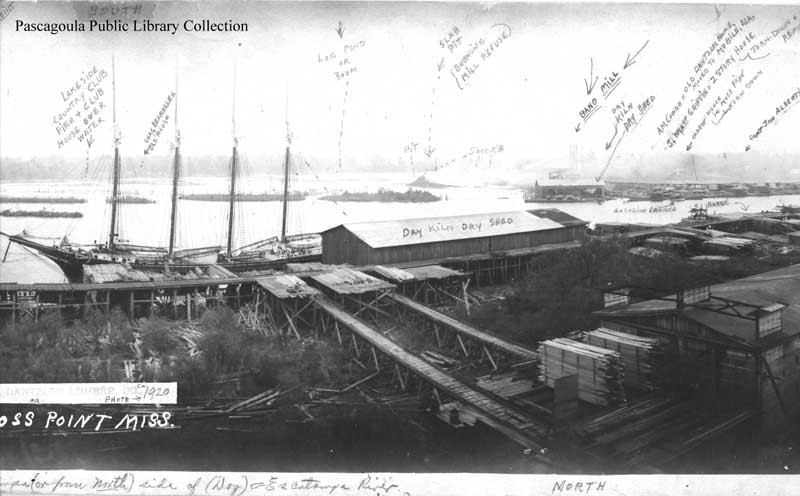
Right section of the panoramic photo above at the "LND Mill" at Moss Point showing the dry kiln and lumber sheds. Part of the "band mill" on the south bank is visible on the right. |
||
|
ROSTER By Gil Hoffman and Tony Howe: (locomotives used at Vancleave) 1
2-6-0
Grant
10-1882
43
14x20
62000
Purchased
from St. Louis Southwestern #52, on 7-11-1900. Built
as Texas & St. Louis #52 "George W. Brown," as 36-inch
gauge; to St. Louis, Arkansas & Texas #52, in 2-1886, changed to
standard gauge in 6-1887; to St. Louis Southwestern #52, in 6-1891. Transferred
to Vancleave Lumber Co. #1, Vancleave, MS.
2 2-6-0 Purchased secondhand about August 1902.
3 2-6-0
Baldwin
-1881
19x24
0000
Purchased
from Southern Iron & Equipment Co. #187, Atlanta, GA, on 10-15-1903. Built as Lake Shore & Michigan Southern #76 ; to Southern Iron & Equipment Co. #187. 4
2-6-0
Baldwin
16x24
70000
Purchased
from Southern Iron & Equipment Co. #353, Atlanta, GA, on 2-3-1906.
Cost $3,250. Built
as Lake Shore & Michigan Southern #486
; to Southern Iron & Equipment Co. #353. 7
2T Heisler
Heisler
1315
-1915
36
15x12
94000
Purchased
new. Transferred
to Vancleave Lumber Co. #7, Vancleave, MS.
|
||
For more information contact Tony Howe at howe6818@bellsouth.net or David S. Price at dsprice46@bellsouth.net